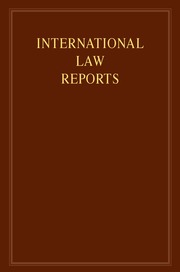No CrossRef data available.
Article contents
Maclsaac v. Canada
Published online by Cambridge University Press: 01 January 2021
Abstract
State responsibility — Nature and kinds of — For wrongs unconnected with contractual obligations — Acts and omissions of State organs and officials — Connected with legislation — Canadian Parole Act 1970 — Criminal Law Amendment Act 1977 — Forfeiture of parole abolished — Right of offenders to benefit retroactively from change of law providing lighter penalty — Whether loss of parole a penalty — International Covenant on Civil and Political Rights, 1966, Article 15(1) — Optional Protocol — United Nations Human Rights Committee — Whether applicant a victim
International organization and administration — The United Nations — Other organs of the United Nations — Human Rights Committee — Functions — Compatibility of national legislation with International Covenant on Civil and Political Rights, 1966 — Optional Protocol — Whether Committee entitled to make hypothetical assessment of effects of national legislation
The individual in international law — In general — Human rights and freedoms — Criminal offences — Parole — Right of offenders to benefit retroactively from change of law reducing penalty — Interpretation of term “penalty” — Whether only applicable to criminal offences — Whether including parole — Canadian Parole Act 1970 modified by Criminal Law Amendment Act 1977 — Whether new law automatically results in lighter penalty-International Covenant on Civil and Political Rights, 1966, Article 15(1) — Optional Protocol — United Nations Human Rights Committee — Whether applicant victim of breach of Covenant
Keywords
- Type
- Case Report
- Information
- Copyright
- © Cambridge University Press 1986


